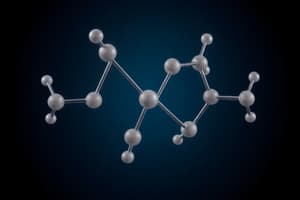Podcast
Questions and Answers
What is the shape of molecules formed by sp² hybridization?
What is the shape of molecules formed by sp² hybridization?
- Octahedral
- Trigonal planar (correct)
- Linear
- Tetrahedral
What is the total number of hybrid orbitals formed by sp³ hybridization?
What is the total number of hybrid orbitals formed by sp³ hybridization?
- 2
- 4 (correct)
- 5
- 3
What is the purpose of hybridization in molecules?
What is the purpose of hybridization in molecules?
- To minimize electron attraction
- To increase electron attraction
- To maximize electron repulsion
- To minimize electron repulsion (correct)
What type of bonds are formed by hybrid orbitals?
What type of bonds are formed by hybrid orbitals?
Where does hybridization occur in an atom?
Where does hybridization occur in an atom?
Flashcards are hidden until you start studying
Study Notes
Hybridization in Chemistry
Definition: Hybridization is the mixing of atomic orbitals to form new hybrid orbitals suitable for bonding in molecules.
Types of Hybridization:
- sp³ hybridization: 1 s orbital + 3 p orbitals = 4 equivalent hybrid orbitals (tetrahedral shape)
- sp² hybridization: 1 s orbital + 2 p orbitals = 3 equivalent hybrid orbitals (trigonal planar shape)
- sp hybridization: 1 s orbital + 1 p orbital = 2 equivalent hybrid orbitals (linear shape)
Key Features:
- Hybrid orbitals are equivalent and arrange themselves in space to minimize electron repulsion
- Hybridization occurs in the valence shell of an atom
- Hybrid orbitals are used to form sigma (σ) bonds
Importance in Molecular Structure:
- Hybridization helps explain the shapes and bond angles of molecules
- It helps predict the type of bonds (σ and π) formed between atoms
- Hybridization is essential for understanding molecular geometry and polarity
Hybridization in Chemistry
- Hybridization is the process of mixing atomic orbitals to form new hybrid orbitals suitable for bonding in molecules.
Types of Hybridization
- sp³ hybridization involves mixing 1 s orbital with 3 p orbitals to form 4 equivalent hybrid orbitals, resulting in a tetrahedral shape.
- sp² hybridization involves mixing 1 s orbital with 2 p orbitals to form 3 equivalent hybrid orbitals, resulting in a trigonal planar shape.
- sp hybridization involves mixing 1 s orbital with 1 p orbital to form 2 equivalent hybrid orbitals, resulting in a linear shape.
Key Features of Hybridization
- Hybrid orbitals are equivalent and arrange themselves in space to minimize electron repulsion.
- Hybridization occurs in the valence shell of an atom.
- Hybrid orbitals are used to form sigma (σ) bonds.
Importance of Hybridization in Molecular Structure
- Hybridization helps explain the shapes and bond angles of molecules.
- It helps predict the type of bonds (σ and π) formed between atoms.
- Hybridization is essential for understanding molecular geometry and polarity.
Studying That Suits You
Use AI to generate personalized quizzes and flashcards to suit your learning preferences.




